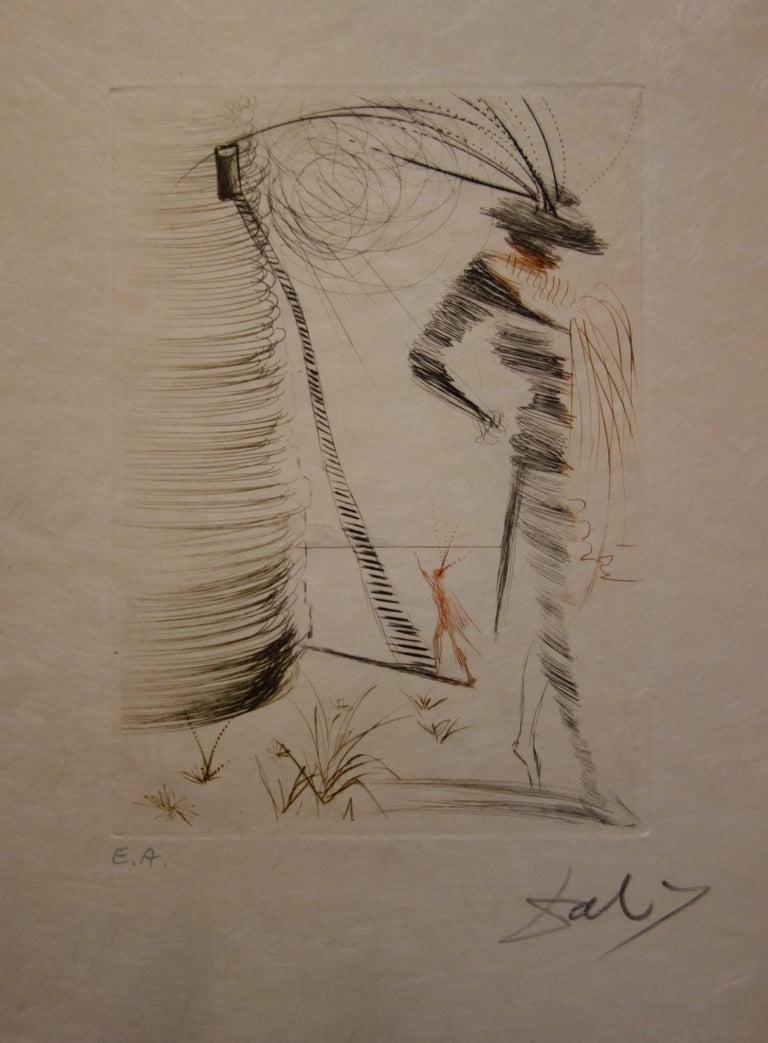Romeo, Romeo, where art thou Romeo?
 Much Ado About Shakespeare: Romeo and Juliet -- Salvador Dalí
Much Ado About Shakespeare: Romeo and Juliet -- Salvador Dalí
Shakespeare is not for a single age,
He belongs
to all ages.
Sweet swan of Avon, with every delightful line,
You gave life some new grace,
Making us feel music`s pulse in all our veins.
You held the world but as a stage
Where every man must play a role
And you played yours so well.
You set to play your solitary time away
And ran the race that nature set so beautifully.
You lived upright and smiled
At fortune`s choice, such a valiant man.
In you, force and beauty met.
Friends to allure and foes to reconcile,
The travail par excellence of your thoughts
Bathed in streams of liquid melody
Created the greatest love story
Reading which young and old are mesmerized.
Every young maiden is looking for Juliet.
‘My bounty is as boundless as the sea
My love as deep ……………..'
Says sweet Juliet to Romeo in a voice, soft and
soothing
And
when Romeo kisses Juliet, she melts in his arms.
The world halts her course, the sun smiles
And roses bloom across the planet,
Spreading a fragrance of love never felt before.
They die for each other and death unites them in
heaven
And their parents on earth.
Love is so miraculous, so fabulous, so magnanimous.
William Shakespeare was baptized on 26 April 1564 (and possibly born on 23 April, exactly 52 years before his death). The son of a glover who was a successful local politician in Stratford-upon-Avon in Warwickshire, England. By 1592 he was pursuing a theatrical career in London, possibly after minding the horses of theater patrons, and his plays (“Titus Andronicus,” “Richard III” and the three parts of “Henry VI”) were being performed then by The Earl of Pembroke's Men, the Earl of Derby's Men, and The Earl of Sussex's Men. In the early days of English theater the acting companies owned their own plays. After 1594, Shakepeare’s works were the exclusive property of the Lord Chamberlain's Men, a company owned by 8 sharers, including Shakespeare himself, that soon became the leading playing company in London. It was founded that year under the patronage of Henry Carey (1st Baron Hunsdon), who, as the Lord Chamberlain, was in charge of court entertainments. After Carey's death in 1596 the company came under the patronage of his son George and was briefly known as Lord Hunsdon's Men, but when he became Lord Chamberlain in 1597 it reverted to its previous name. (The company became the King's Men in 1603 when James I awarded it a royal patent.) Shakespeare wrote “Romeo and Juliet” between 1591 and 1595. It is not known what part Shakespeare the actor played, but Richard Burbage, the company’s chief actor and shareholder, was probably the 1st Romeo, and a boy, Robert Goffe, the 1st Juliet. The play’s dramatic structure (especially effects such as switching between comedy and tragedy to heighten tension, the expansion of minor characters, and the use of sub-plots to embellish the story) was an early sign of Shakespeare’s skill, as was his application of different poetic forms to different characters; Friar Laurence, for example, uses sermon and sententiae (proverbial) forms. Juliet displayed an epithalamium in one of her speeches, Mercutio a rhapsody in his Queen Mab speech, and Paris an elegy. Juliet used monosyllabic words with Romeo but formal language with Paris, her betrothed. Common folks spoke in prose rather than poetry. Sometimes the forms themselves evolved as the character developed. For example, early in the play when Romeo extolled Rosaline’s charms he used the Petrarchan sonnet form (often used to exaggerate the beauty of women who were impossible for the male poet to attain), which was becoming archaic in English by the time Shakespeare wrote, so when Romeo met Juliet he adopted the Shakespearean sonnet mode. One of Shakespeare’s most popular plays, it was one of his 1st to be performed outside England (in Nördlingen, Bayern, in 1604). Due to a dispute with their landlord, 6 of the Lord Chamberlain’s Men dismantled the theater where they performed and rebuilt it in 1599; the new theater, The Globe, opened in the summer of 1599, possibly in time for the opening production of Shakespeare’s” Henry V” (in which he performed as Chorus) or possibly his “Julius Caesar” in September. He also continued to act in his own plays (as the ghost of Hamlet’s father in “The Tragedy of Hamlet, Prince of Denmark,” between 1599-1602, and Adam in “As You Like It,” perhaps written in 1599 and performed in 1603), and other plays, notably Ben Jonson's “Every Man in His Humour” (1598) and “Sejanus His Fall” (1603). His theatrical career made him a wealthy man, and in 1597 he bought the 2nd-largest house in Stratford. He probably retired to Stratford soon after 1608 (though he continued to spend time in London as well) and stopped writing in 1613; his last 3 plays were collaborations with John Fletcher, who succeeded him as the King’s Men’s house playwright. On 29 June 1613, during a performance of his “Henry VIII,” a theatrical cannon misfired, igniting the Globe’s wooden beams and thatching; the theater was destroyed, but the only injury was a man whose burning pants were put out with a bottle of ale.
ReplyDelete